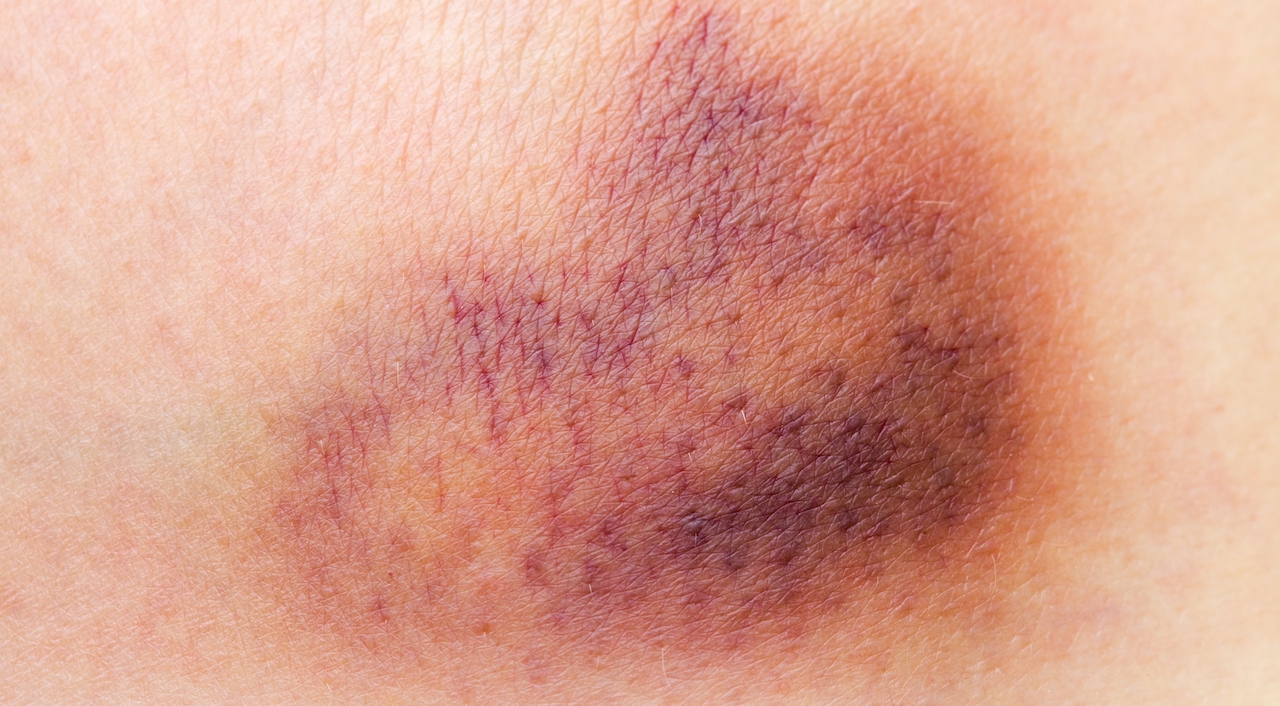Are you always rushing around and bumping into objects, or sometimes just plain clumsy? Coming up “black and blue” full of bruises can be painful and unsightly. Some bruises are quite harmless, while others can suggest a more serious problem! Have a look.
What is a bruise?
- An area of skin discolouration, that does not become pale when you press it.
- A common skin bruise due to physical injury. It happens when small blood vessels are damaged, causing blood to leak underneath the skin.
- Also known as a “contusion”
- A bruise is initially reddish in colour, then becomes blue-purple over a few hours, and finally yellow-brown after a number of days
- The skin is usually not broken
- Bruises are often tender or painful and associated with swelling
The three types of bruises
- Subcutaneous: beneath the skin
- Intramuscular: inside the muscle
- Periosteal: bruising in a bone
What is purpura?
- Purple-coloured spots and patches that occur on the skin and mucous membranes
- They occur when small blood vessels leak blood under the skin
- They are caused by internal bleeding, not caused by physical injury
- Petechiae are purpura spots that are smaller than 3mm in diameter
- Ecchymoses are purpura spots that are larger than 1cm in diameter
What are some of the causes of purpura?
Platelets and clotting factors found in our blood helps the blood to clot when you get an injury. The following conditions can lead to these purple-coloured spots (purpura):
a) Normal platelet counts (non-thrombocytopaenic purpura)
- Congenital conditions such as CMV or rubella virus (present at birth)
- Scurvy (due to severe Vitamin C deficiency)
- Weak blood vessels
- Inflammation in blood vessels (i.e. Henoch-Schonlein purpura)
- Certain medication that affects platelet functioning (i.e. steroids)
- Blood clotting disorders
b) Low platelet counts (thrombocytopaenia purpura)
- Infection in the blood stream (i.e. meningococcal meningitis)
- Immune disorders (ITP – the cause of which is unknown)
- Medication that decreases the platelet count
- Infants of mothers who have ITP
When should you see a doctor about bruising?
- When bruising occurs easily, or without an obvious reason (i.e. without trauma)
- If there is swelling and a lot of pain (especially if the person is taking blood-thinner medication)
- If you bruise easily, and your gums and/or nose also bleed frequently
- When a bruise doesn’t improve in 2 weeks, or doesn’t go away after 4 weeks
- If a person cannot remember the injury or had a concussion
- When the bruise is under a fingernail, or toenail
- If there is a family history of bleeding/clotting disorders
What can you do to prevent unnecessary bruising?
- Remove clutter from common walkway paths in your home and office
- Use a night-light when getting up at night to use the bathroom
- Wear protective clothing when playing contact sport
- Wear long-sleeve shirts and trousers to provide extra protection
- Monitor the dose of blood-thinner medication, such as warfarin, by having regular blood tests
- Make sure rugs and carpets are secure to prevent unnecessary trips or falls
- Ensure that electrical cables and telephone cords are out of harm’s way
What can be done to treat a bruise?
- Immediate treatment , whilst the bruise is still reddish, is likely to be the most effective
- Apply an ice-pack (wrapped in a towel) for 30 minutes , as soon as possible (this reduces swelling and facilitates healing)
- If a limb has been injured, elevate your arm or leg above the level of the heart
- Rest the bruised area
- Consider paracetamol or an anti-inflammatory medication
- In some cases, after 48 hours, a warm cloth can be applied for 10 minutes 3x/day











